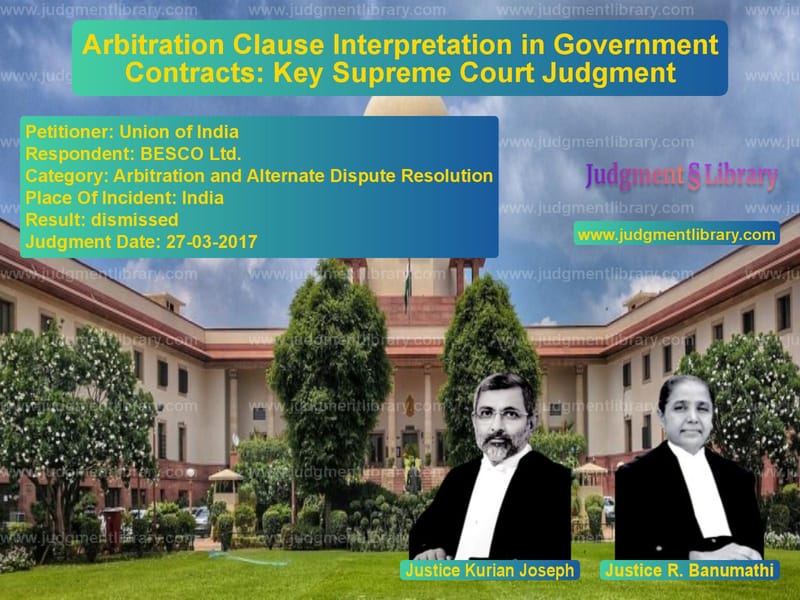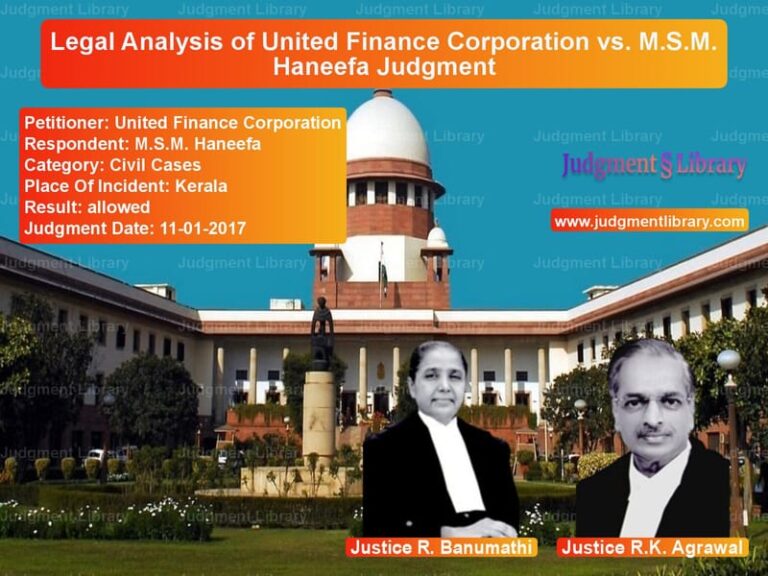Arbitration Clause Interpretation in Government Contracts: Key Supreme Court Judgment
The Supreme Court of India recently delivered a crucial judgment in Union of India v. BESCO Ltd., addressing the interpretation of arbitration clauses in government contracts. The primary issue before the Court was whether the Chief Justice of a High Court or a designated authority, while exercising powers under Section 11(6) of the Arbitration and Conciliation Act, 1996, is bound to appoint an arbitrator as specified in the agreement.
Background of the Case
The dispute arose when the appellant, Union of India, failed to appoint an arbitrator within the stipulated time under the agreement. Consequently, the respondent, BESCO Ltd., approached the High Court for the appointment of an independent arbitrator. The High Court ruled in favor of the respondent and appointed an arbitrator outside the specifications of the contract.
Arguments of the Appellant
The Union of India, represented by the Additional Solicitor General, contended that the High Court was bound by the contract’s arbitration clause, which specified that only a gazetted railway officer could act as an arbitrator. They relied on precedents set in Union of India v. M.P. Gupta and Union of India v. Master Construction Company, arguing that once an arbitration clause prescribes qualifications for an arbitrator, courts must adhere to it.
Arguments of the Respondent
BESCO Ltd. argued that once the Union of India defaulted on appointing an arbitrator within the agreed time, the right to appoint was forfeited. They relied on judgments in Northern Railway v. Patel Engineering and North Eastern Railway v. Tripple Engineering Works, asserting that the High Court had the discretion to appoint an independent arbitrator.
Judgment and Key Observations
Justice Kurian Joseph, delivering the judgment, held that:
- Once a party forfeits its right to appoint an arbitrator, the Chief Justice or the designated authority is not bound to appoint an arbitrator from the contract’s panel.
- The Chief Justice or the designated Judge may appoint an independent arbitrator while considering the qualifications mentioned in the agreement.
- Reliance was placed on Indian Oil Corporation v. Raja Transport, where the Court held that an independent arbitrator could be appointed if circumstances raise doubts about the neutrality of the named arbitrator.
Conclusion
The Supreme Court dismissed the appeal, affirming that courts have discretion in appointing arbitrators when a party defaults on its contractual obligations. This ruling reinforces judicial intervention in ensuring fair arbitration proceedings.
Don’t miss out on the full details! Download the complete judgment in PDF format below and gain valuable insights instantly!
Download Judgment: Union of India vs BESCO Ltd. Supreme Court of India Judgment Dated 27-03-2017.pdf
Direct Downlaod Judgment: Direct downlaod this Judgment
See all petitions in Arbitration Awards
See all petitions in Dispute Resolution Mechanisms
See all petitions in Enforcement of Awards
See all petitions in Judgment by Kurian Joseph
See all petitions in Judgment by R. Banumathi
See all petitions in dismissed
See all petitions in supreme court of India judgments March 2017
See all petitions in 2017 judgments
See all posts in Arbitration and Alternate Dispute Resolution Category
See all allowed petitions in Arbitration and Alternate Dispute Resolution Category
See all Dismissed petitions in Arbitration and Alternate Dispute Resolution Category
See all partially allowed petitions in Arbitration and Alternate Dispute Resolution Category







